Austrians bust international trade in endangered species
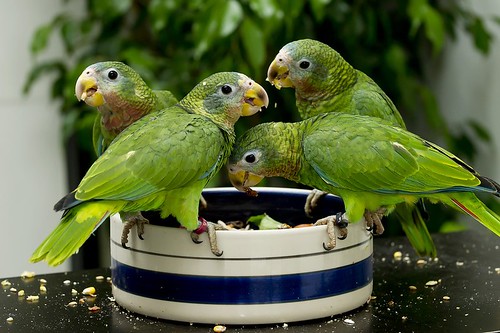 Juvenile Yellow-billed parrots raised from smuggled eggsVIENNA, Austria — The star attraction at the Vienna Zoo these days are a flock of rare Jamaican parrots smuggled out of the island as eggs by two Slovak nationals who were intercepted at the airport in this Austrian capital.
Juvenile Yellow-billed parrots raised from smuggled eggsVIENNA, Austria — The star attraction at the Vienna Zoo these days are a flock of rare Jamaican parrots smuggled out of the island as eggs by two Slovak nationals who were intercepted at the airport in this Austrian capital.
The interception of the men, who were posing as tourists returning from a Jamaican vacation in April this year, made big headlines in Vienna and authorities here said it marked the smashing of a lucrative illegal trade in endemic species.
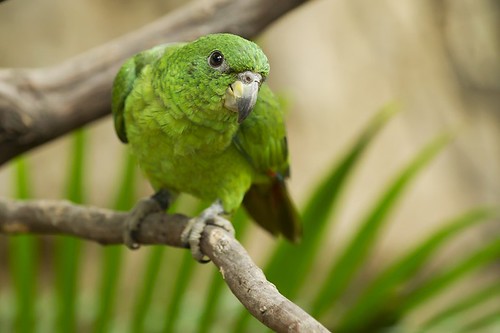 Black-billed parrot raised from the seized eggsOn the international black-market the price for the parrots range from 4,000 to 15,000 euros each. One of the bird eggs costs 500 euros in Jamaica.
Black-billed parrot raised from the seized eggsOn the international black-market the price for the parrots range from 4,000 to 15,000 euros each. One of the bird eggs costs 500 euros in Jamaica.
"The protection of endangered animals species is of utmost importance... Our colleagues at the Customs Department play a key role in the daily fight against unconscionable smugglers," said Austrian finance minister, Dr Maria Fekter, who commented on the incident.
 Black-billed parrots"This case shows that they are having tremendous success in cracking an international smuggling ring. I heartily congratulate our Customs Officers on this great success for the protection of animals," he was quoted as saying.
Black-billed parrots"This case shows that they are having tremendous success in cracking an international smuggling ring. I heartily congratulate our Customs Officers on this great success for the protection of animals," he was quoted as saying.
The egg find was made when customs officers searched the two Slovak nationals — identified only as Marian P, 45 and Roland P, 39 — on arrival at the Eisenstadt Airport here. They claimed that they had been on vacation in Montego Bay, St James on the island's scenic north coast.
Hofrat Erich Fleckl, fraud control coordinator at the Eisenstadt Airport Vienna Customs Department, described how the Jamaican parrots were discovered.
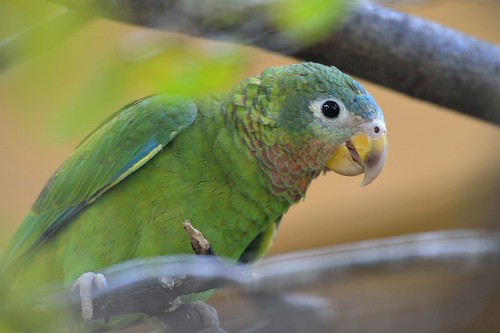 Yellow-billed parrotThe flight from Duesseldorf, Germany landed in Vienna and customs officers noted that the Slovaks had suitcases with white labels on them. That meant that they had travelled from a non-EU country via Duesseldorf. The two were escorted to the customs control area.
Yellow-billed parrotThe flight from Duesseldorf, Germany landed in Vienna and customs officers noted that the Slovaks had suitcases with white labels on them. That meant that they had travelled from a non-EU country via Duesseldorf. The two were escorted to the customs control area.
Both insisted that they had bought nothing in Jamaica except for a few cake packages as souvenirs. But following his instinct, one of the customs officers decided to scrutinise the men's luggage more closely and found packages containing chocolate cookies in Roland P's luggage. Marian P's luggage also had cake packages along with a coconut carved in the form of a monkey.
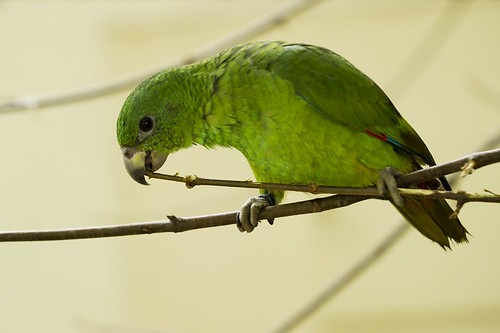 The Black-billed parrot is endemic to JamaicaX-Ray pictures suggested, however, that there was content other than cookies.
The Black-billed parrot is endemic to JamaicaX-Ray pictures suggested, however, that there was content other than cookies.
A further search of Marian P's luggage turned up two cookie boxes and in the coconut, the controllers found 74 bird eggs. The customs criminal investigation department was immediately contacted.
The bird eggs were confiscated and the Slovaks interrogated. Roland P denied any knowledge about the eggs, but Marian P claimed that he really liked the 'green birds' in Jamaica and he accepted the eggs as gifts, without knowing what types of eggs they were. Both men were released and allowed to continue their journey.
Still, the customs officers suspected that this was a case of illegal smuggling of protected species. They had to act quickly. On the very same day, the eggs were taken to the Vienna Schoenbrunn Zoo which staff speedily adapted to facilitate its new future residents. An appropriate living area was created, and incubators and special bird feed had to be procured.
After an incubation period, 45 parrots — 22 Black-billed and 23 Yellow-billed Amazons — were successfully hatched from the 74 eggs spirited out of Jamaica.
As the hatchlings became fully-feathered birds, the initial suspicions that the birds were from endangered species endemic to Jamaica were confirmed.
A specialist team of 10 animal-care staff cared for the birds round-the-clock, losing only five of the initial 50 hatchlings.
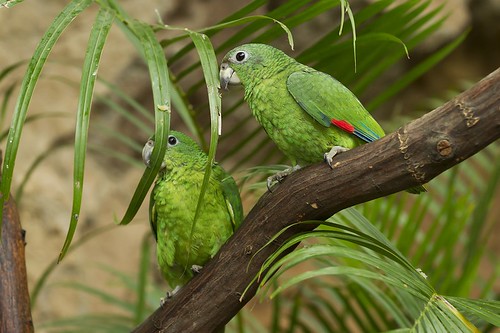 Black-billed parrots are classified as Vulnerable by IUCNMeantime, the Slovak authorities were contacted and a raid on the men's homes found documents which were falsified to show that the parrots had European origins.
Black-billed parrots are classified as Vulnerable by IUCNMeantime, the Slovak authorities were contacted and a raid on the men's homes found documents which were falsified to show that the parrots had European origins.
The fines for smuggling the birds under the Austrian Trade in Endangered Species Act ranges between 1,000 and 40,000 euros, depending on the species of endangered parrot.
Since the end of September, the birds can be seen in their new home near to the giraffe station at the Vienna Schoenbrunn Zoo. To see the hatchlings perfect their climbing and flying skills is regarded as a once in a lifetime chance for bird-watchers and parrot lovers.
The zoo plans to keep some of the parrots, while giving others to scientific zoos for research purposes. They also plan to develop a programme for sustaining the hatching of these birds in Europe.
Both species of Amazona parrots are found exclusively as wild life in Jamaica, in such areas as the Cockpit Country in Trelawny and John Crow Mountains in Portland. They are protected under Jamaica's Wild Life Protection Act, which makes the commercial handling, as well the keeping of these birds as pets illegal.
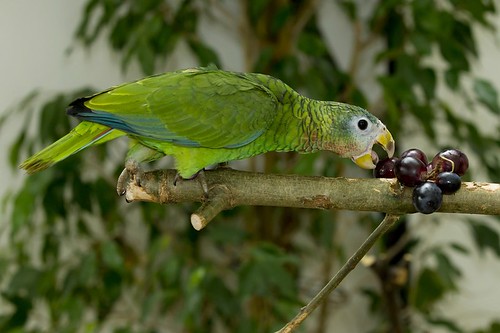 Endemic to Jamaica, Yellow-billed parrots are classified as VulnerableNEPA, the National Environment and Planning Authority, could not be immediately contacted for comment.
Endemic to Jamaica, Yellow-billed parrots are classified as VulnerableNEPA, the National Environment and Planning Authority, could not be immediately contacted for comment.
However, it appeared Jamaica could stake a claim to the birds under Article VIII of the CITES/Washington Convention which states, inter alia:
"Where a living specimen is confiscated as a result of measures referred to in paragraph 1 of this Article the specimen shall be entrusted to a Management Authority of the State of confiscation; the Management Authority shall, after consultation with the State of export, return the specimen to that State at the expense of that State, or to a rescue centre or such other place as the Management Authority deems appropriate and consistent with the purposes of the present Convention."